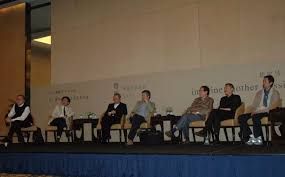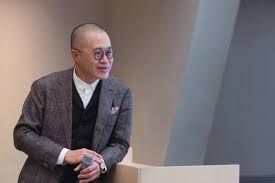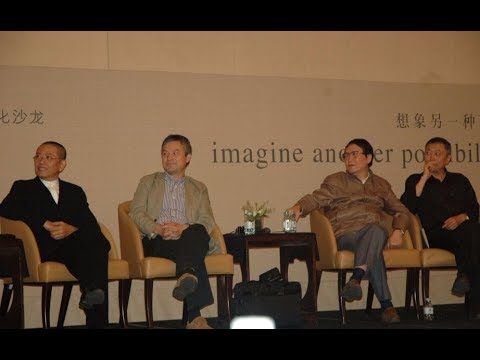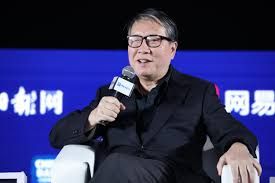加拿大法律工作者,法律问题中尤其关注宪法/行政法,也关心中共党史/共和国史/政治哲学/性别问题/LGBT/两岸三地公民社会相关问题/民主转型问题/摇滚乐/电影
'Imagine the next decade' - how they predicted this decade a decade ago
" Predicting what the next ten years will be like. As a historian, I have learned that prediction is impossible, not only for China, but also for the world and a certain person, including where I will be in ten years from now. Where, will it be in prison? Or where? It’s hard to say.” --- Qin Hui, 2010
The new decade kicks off. When teachers Liang Wendao, Yi Zhongtian, He Weifang, Qin Hui, and Chen Danqing experience the next decade of their lives, will they remember that they were in the "Utopia 2010 Cultural Forum" in 2010 As for the forecast for the 2010s, what do they think of this unpredictable 2010s?

It was the first year of the past decade, and public knowledge was still used as a kind of honor rather than infamy. The issue that intellectuals are keen to discuss is the debate between political system reform and the existence of universal values; the economy is developing at a high speed, and the society is more Many issues point to this rapidly changing money era, and the widening gap between the rich and the poor has also made forced demolition/judicial injustice a hot topic, which corresponds to a vigorous experiment conducted by then political star Bo Xilai in Chongqing. ; At that time, blogs were still hot, Weibo was in the ascendant, and the Internet seemed to provide the soil for a possible civil society, and also cultivated a group of opinion leaders with different fates later; The influence of traditional media was still strong, and reports from the Southern Department often triggered Huge discussion. It was at such a time when it seemed to see the cracks and still feel the strength of the system that this lecture, which now seemed impossible, was held. (https://book.ifeng.com/yeneizixun/special/lixiangguo2010/pinglun/detail_2010_09/30/2679805_0.shtml)
1. Liang Wendao: Could everyone's life be better in a worse era?
Liang Wendao, the host of that event, mentioned an interesting survey at the beginning. In a survey in Hong Kong, respondents were asked two questions: First, do you think you will live in the next ten years? better? The other is do you think Hong Kong will be better in the next decade? The conclusion of the survey is very interesting. Most people believe that they will have a better life in the next decade, and at the same time they are more pessimistic about the Hong Kong society in the next decade. The question is: in an era where the whole is getting worse, is it possible that everyone will get better?

Second, Yi Zhongtian: I have confidence in the post-60s/70s/80s
Teacher Yi Zhongtian's imagination for the 2010s focuses on the generation represented by age. He believes that the main group in Chinese society in the 2010s was the post-60s, post-70s and post-80s. Compared with the previous era, this group of people was encountering reform and opening up and the 1992 South Speech, which coincided with China's recent decades. The most active and open era in the ideological and educational circles; compared with the post-90s generation, these generations just avoided the "indefatigable" policy of education industrialization. Therefore, compared with any other generation, they have been affected by it. The best education, so Teacher Yi believes that although the future is unpredictable, he still has confidence in these generations.

As for himself as a post-40s generation, he joked that he can only study hard "Grandson's Art of War" and learn how to take care of his grandchildren.
3. He Weifang: When can we start direct election of county magistrates?
Mr. He Weifang's imagination of the 2010s focused on the timetable for political reform. He believed that the space for political reform was very small after the past three decades. He mentioned the definition of "democratic politics" in the speech of then Premier Wen at the time: national leaders are elected by the people, the judiciary is independent, and the press is free. Mr. He Weifang believes that apart from judicial independence, which is not the proper meaning of democracy, the other two are important meanings of democracy. Therefore, he asked several questions: When can the county governor be directly elected? When can the governor be directly elected? Or direct elections from the top leadership?
Teacher He believes that such a timetable and roadmap is difficult. One is that further reforms may “break the muscles” and touch the forbidden areas that were previously unreachable; the other is that we are still facing the problem of “unclear division of labor among government departments” mentioned by Liang Qichao, and temporary departments often have a higher capacity than permanent ones. The greater power of the department, this phenomenon has continued from the military aircraft to the present, the result is "Kowloon water control, Kowloon does not control the water" . He settled on the judicial system that he cared about the most. He believed that an unjust judicial system would put the officials and the people in a state of extreme confrontation and could not be relieved. At that time, the judicial reform that lasted for nearly two decades was faced with the "black attack" method. The threat of a big retrogression of "hitting the black".
In the question-and-answer session, the audience also raised the issue of ethnic minority autonomy to He Weifang, and Mr. He bluntly criticized the ethnic autonomy policy at that time. First, he classified any action of minority rights protection as "independence", which made the local government have Opportunity to use this as an excuse to escape responsibility for any policy. Second, ethnic minorities still only play the role of "vases" in the power system. The members of the Politburo Standing Committee are nine old men , and there are no ethnic minorities at the top of the power hierarchy.
At the time of the lecture, He Weifang was volunteering at Shihezi University. There was a lot of discussion about this unusual arrangement of teaching support. Some people thought it was an "exile" and punishment for his clear political stance. At the same time, the "Chongqing Model" was in full swing, and the legal circles were arguing endlessly about the "striking black" that seemed popular but violated legal procedures. Looking back ten years later, the hustle and bustle at that time seems to have become an official one. The conclusion is ended, but it seems to have been inherited to a certain extent.
Fourth, Qin Hui: I may be in prison in ten years
Teacher Qin Hui thought it was impossible to predict from the very beginning, "Whether it is China in ten years, or myself in ten years, it is unpredictable, whether I will be in prison in ten years, these are all questions. There is no way to predict.” Although prediction is impossible, expectation is possible, and this expectation is not only a Chinese expectation, but also an expectation of the whole world. To some extent, it can be called a “universal expectation”. value".

At the time of the speech, the debate on universal values was raging. Some scholars believed that the reason why China, which was making rapid economic progress at that time, lacked "soft power" was because China was led by Western concepts and universal values, and therefore should be promoted "Benevolence, Righteousness, Wisdom and Faith". Teacher Qin Hui firmly criticized this statement. He said that anyone can say that they are against universal values, but Marxists cannot, because no other thinker contains so many universal values in the theory like Marx. ingredients, such as "The proletarians of the world unite." When it comes to "benevolence, righteousness and morality", in the 1850s and 1960s, many well-known officials in the study of etiquette who only received traditional education arrived in the West, but they felt that this was "benevolence and righteousness morality". They commented on the West: "Washington created the method of election, and it is almost the public in the world" (in the words of Xu Jishe, governor of the Hanlin Fujian Province in the Qing Dynasty); (The Qing government envoy to the UK/French), and in turn, these traditionally educated intellectuals believed that the Qing government was "inhumane and injustice" and that "the government of the two thousand years has been the government of Qin, and it is also a thief." (Tan Sitong ). Teacher Qin Hui concluded that no matter whether we use the words of "democracy and freedom" or the words of "benevolence, righteousness and morality", the judgment on the basic "truth, goodness and beauty" of things is consistent. Most people's basic judgment of truth, goodness and beauty will not change due to cultural differences.

Vested interest groups may make different judgments due to the influence of their interests, which has nothing to do with China and foreign countries. Hitler, for example, declared that German democracy was neither Soviet nor American, but Germanic . The typical feature of Germanic democracy is the leadership of the National Socialist Workers Party (that is, the Nazi Party), but in the end, this Germanic democracy also disappeared. Teacher Qin Hui went on to say that he did not know what the next ten years would be like. .
Teacher Qin Hui concluded that he always believes that history is uncertain, how the past evolves into the present is uncertain, and how today will evolve into the future is even more uncertain. If the future is destined to be doomed, then today's efforts are destined to draw water from a bamboo basket; if the future is destined to flourish, then we can go back to sleep. If the future is very tragic, then we can neither blame Confucius nor Qin Shihuang, and probably only blame our own efforts for not enough.
Fifth, Chen Danqing: I have no expectations, only waiting
Teacher Chen Danqing said at the beginning, "I don't have any expectations. Our generation has more experience in waiting. In the 1970s, waiting was the "waiting policy". What is the policy of educated youth can be implemented and can be in a place closer to home? The place jumps the queue; the second is to wait for Chairman Mao to die, we all know what the other party is waiting for, and we can see what the other party is waiting for by looking at our eyes, but when we wait, we have no imagination at all, and we don’t know what will happen in the future.” He himself is now I'm still waiting, waiting for a change.
Chen Danqing grew up in such an environment, and he often heard the words " we get better day by day, others get worse day by day". He said that he saw a lot of things getting better day by day, and the changes were beyond his imagination, but what would rot day by day was completely unimaginable. "When I first returned to China, Han Han was 18 years old, and blogging just started to become popular. Now (2010) Han Han's blog is still there, and aiweiwei's blog is no longer there. I can't predict what will happen in the next ten years." He concluded, I am a person who lacks imagination. I don't know if Han Han's blog will disappear next year, and I don't know what the fate of the newly emerging Weibo will be.
Teacher Chen Danqing also mentioned a piece of news in Tsinghua University at that time. A classmate wrote an article criticizing the "angry youth", believing that the negative news reported by the news media was accidental and only concerned with negative social one-sided words. He said that in the future , In ten years, there will only be more and more students like this, and everyone will not think this is news.
6. Conclusion: Can we still imagine the next decade?
A decade later, that lecture's predictions now seem a bit overly optimistic, some marvel at their foresight. I often hear a sentence, "2019 was the worst year in the past ten years, and it will be the best year in the next ten years." It's hard to judge what happened in the past, and what the future will be like, but I seem to I have lost the courage to imagine the future, or rather, I am unwilling to imagine. After all, when the gap between expectations and reality is too great, it is a safer choice not to imagine. It's just that the price of injustice falls firmly on people, especially those who don't have a voice.
In the last question and answer session, Mr. Qin Hui said: "Taiwan has forgotten about "228" for a long time. Many old people say that we have been forgotten. How can we forget? Hungary was very important in the 1970s. Prosperity, the Hungarians at that time were thinking about where to travel and where to go on vacation. But human memory will not perish. Every generation has feelings, like Nietzsche saying that God is dead. In fact What he said about the death of God is the same as what we say today about the loss of conscience. But the fire of the times will not be extinguished."
Like my work?
Don't forget to support or like, so I know you are with me..
Comment…